Climate change is no longer an abstract threat, and scientists agree: the next ten years will define the next hundred.
The reality is that investing in sustainability is good for business and the planet. There’s an urgent need for environmentally sustainable solutions that don’t yet exist — and a growing number of entrepreneurs are stepping up to meet the challenge.

But turning bold ideas into scalable impact takes more than vision; it takes support.
The Cox Cleantech Accelerator launched in Atlanta, GA, to back startups pioneering the next big thing in sustainability. A partnership between Cox Enterprises, gener8tor and the Georgia Cleantech Innovation Hub, this 12-week program is open to any startup focused on solving for climate and environmental crises. Each cohort consists of five companies that receive a $100,000 investment from Cox Enterprises, plus mentorship and connections to help them scale, secure pilots and land commercial contracts.
Miguel Granier, managing director of the Cox Cleantech Accelerator, explained that the program is more focused on helping these emerging companies achieve commercial success than raising capital.
“Our view is that if they get commercial pilots and contracts, raising money will come easily, so we’d rather focus on that part,” Granier explained.
The program’s first cohort wrapped earlier this summer, and the results offer a hopeful glimpse of what’s possible when ambition meets support: “Watching them mature as they’re dealing with real customers and getting real contracts and getting real revenue and starting to focus on that aspect of the business is really incredible,” Granier said.
We caught up with the Cox Cleantech Accelerator’s first cohort to hear about their experience in the program and how it’s helping them scale their companies.
Flux Hybrids: Electrifying Automotive
What if we could cut transportation emissions without replacing every gas-powered car on the road? That’s the idea Micah Ulrich, CEO of Flux Hybrids, explored as part of his thesis for his master’s degree in mechanical engineering at North Carolina State University.
He took a battered 2008 Ford Ranger and retrofitted it with hybrid technology — doubling its fuel efficiency from 16 to 34 miles per gallon.
That was the moment it clicked: Ulrich wasn’t just tinkering with a class project; he was uncovering a real solution to a widespread problem. That insight laid the groundwork for Flux Hybrids’ proprietary system, which can convert any gas or diesel vehicle into a plug-in hybrid.
Today, Flux Hybrids is helping fleet operators modernize aging vehicles — boosting fuel economy, cutting emissions and offering the flexibility to run on electric power when charging is available (or gas when it’s not).
“Our system does it at a price point that pays for itself in savings, letting you electrify your fleet in a way that saves money and actually helps the environment,” Ulrich explained. “It’s no longer a question of if people want this, but how we get it to them.”
Ulrich joined the Accelerator’s inaugural class to move beyond one-off pilots and start scaling up production. In the final weeks of the program, Ulrich said he’s prepared to move into the next stage of growth.
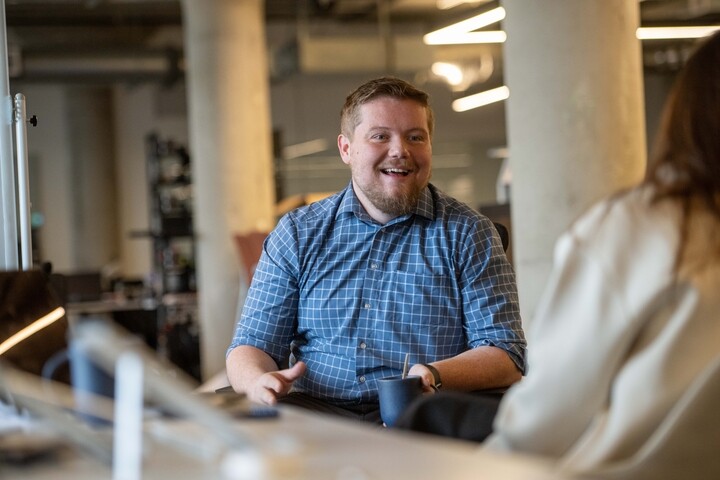
“We’re in a much better spot than we were even two months ago, let alone when we first started talking about this program last fall,” he said. “We’ll be looking at raising more capital and expanding our production capacity because we’re about at the point where we have more demand than we can handle. So, it’s about time to build the team out and grow in Atlanta and the rest of the Southeast.”
Accelerate Wind: Rooftop Renewables
While on a Fulbright scholarship in the Netherlands, Erika Boeing was sitting on a terrace, taking in the buildings around her. Then she noticed the wind curling along the rooftops — a small moment that sparked a whole new perspective on sustainable energy.
“I had this thought pop into my head, ‘Does wind naturally increase as it goes over the edges of roofs? And if so, is that something that we can use to produce meaningful power?’” she recalled. “And when I did the math, I got really excited because I realized that it was actually a big opportunity.”
Boeing’s realization was the beginning of Accelerate Wind, a startup that produces affordable energy for commercial buildings.
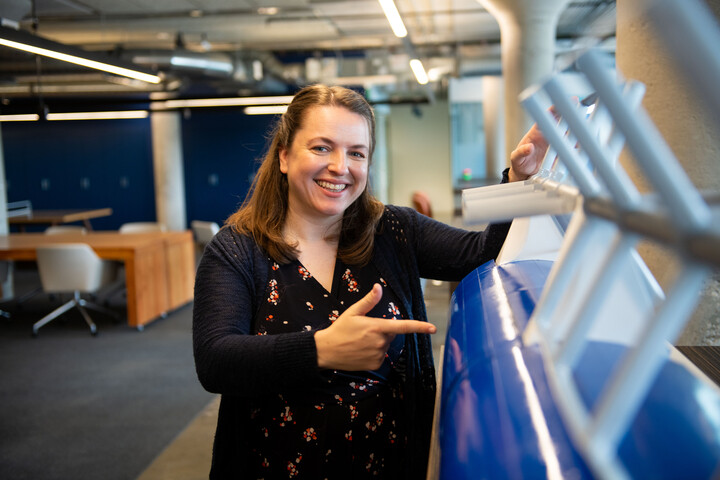
“[It] captures wind as it goes over the edge and is able to pay itself back with similar or better payback time than solar,” Boeing said. Accelerate Wind’s patented turbine can also be installed alongside solar panels, “helping buildings as much as double their overall energy output from renewables.”
With their headquarters in Birmingham, AL, the Accelerate Wind team had their sights set on Atlanta’s thriving venture environment. The Accelerator seemed like the ideal opportunity to make important connections in the city.
Through the program, Boeing and her team gained fresh insight into the needs of Fortune 500 companies, which prompted them to rethink how they sell to larger customers. After a whirlwind of meetings with both investors and potential partners like solar installers, Boeing says she now has a much clearer picture of how her company fits into the Atlanta ecosystem and what steps to take next.
Kara: AI-Powered Sustainability Compliance
What companies report about sustainability today shapes where capital flows tomorrow. But for many, tracking that data has been slow, messy and stuck in outdated systems. That’s the problem Miriam Roure saw firsthand while working at a venture fund in New York City.
“What became apparent to me is that there’s a future in which every single financial transaction can have a climate risk or sustainability risk component to it,” said Roure, who previously worked as a data science and urban dynamics researcher at MIT. “What was missing was this sustainability data record that could be included in financial transactions, as well as the tools necessary to gather this data.”
Inspired by that challenge, Roure spent the last couple of years developing Kara, a fast, low-cost AI compliance platform designed to transform how investors and businesses manage sustainability risk. As Kara shifted its focus to commercialization last year, the company has gained significant momentum through the Accelerator.
“We had been building the platform kind of in stealth [mode], so this Accelerator has really elevated, professionalized and prepared our company for the next stage of growth,” Roure said.
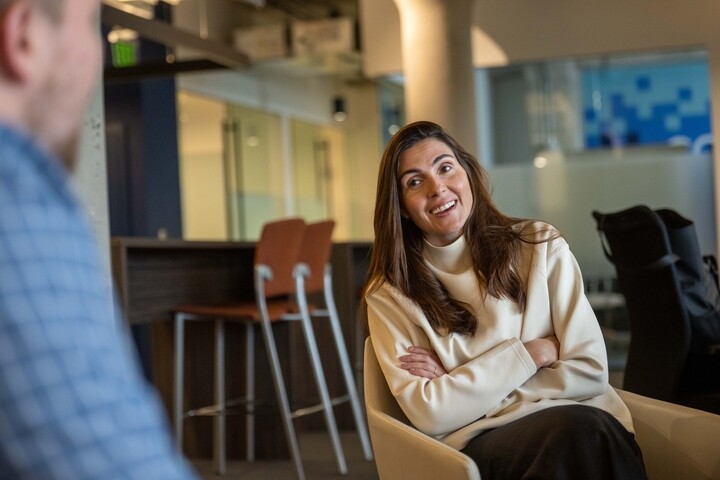
Along with the coaching and mentorship she received during the program, Roure said the Accelerator introduced her to a new network of corporate partners, potential investors and local tech talent in the Southeast.
“Coming to Atlanta has opened tons of new doors; it’s a network that we weren’t connected to before as a New York–based company, and that has a lot of value to us,” Roure said. “Atlanta is a fantastic cleantech and fintech ecosystem, so it’s a perfect match for us.”
Joulea: Redefining Energy Efficiency
Every month, businesses pour money into utility bills — but unseen inefficiencies quietly drain energy and dollars. The EPA estimates that 30% of the energy used in commercial buildings is wasted. It’s a problem hiding in plain sight — and one that Joulea’s team is tackling head-on.
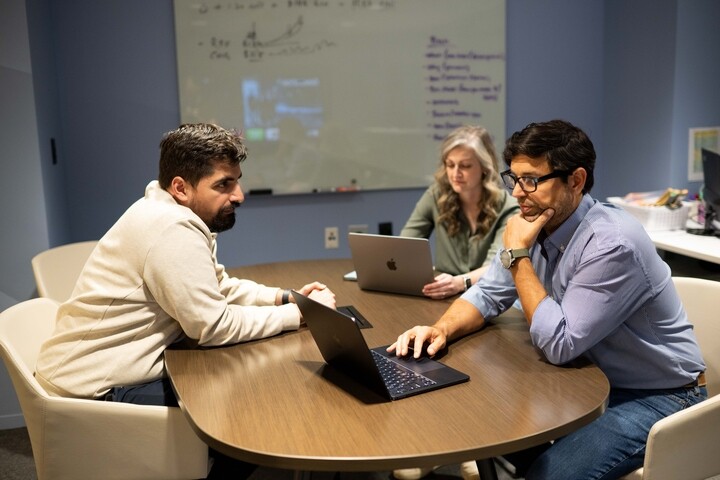
Leveraging AI, drone technology and deep expertise in building energy systems, Joulea’s smart energy assessments help building owners identify inefficiencies to conserve energy and reduce operating costs as well as their carbon footprint.
“We are helping make buildings more energy efficient in a way that is very data driven, analytical and thorough,” said Kiarash Ahmadi, chief technology officer (CTO) at Joulea.
The Joulea team joined the Accelerator in search of mentorship, seeking specifically to strengthen their processes and refine their talk track about their product’s value proposition.
“This experience came together at a pivotal point in our company, where we have a big project that we’re working on as we’re going through this program,” Ahmadi said. “We’re leveraging all the lessons that we’ve learned from Miguel, from [program director] Hannah [Turner], from the mentors we’ve met and taking all the feedback in how to go about evaluating our business model, our marketing strategy and refine our technical roadmap.”
4Earth: Smart Water Recovery
In a world facing growing water scarcity and mounting industrial waste, a circular economy — where resources are reused, not wasted — is becoming increasingly essential.
The challenge? Most water treatment solutions aren’t built for speed, scale or simplicity. 4Earth’s solution changes that: portable, automated water treatment units that make it easier to recycle and reuse water on-site.
Utilizing materials science, innovative water treatment processes, automation and machine learning, the technology is designed to seamlessly “plug into” industrial factories, plants and data centers, explained Jahanzeb “Jahn” Khan, founder and CEO of 4Earth.
“We’re taking their wastewater and treating it to turn it into a resource that can be reused back into their process,” he said. “And, as you can imagine, that’s saving water while saving them a lot of money every day.”
For Kahn and 4Earth, joining the Accelerator was a natural step because he had already been in conversations with Cox Conserves, the company’s national sustainability program, to explore uses for his product across Cox to support the company’s water conservation goals.
One of the biggest value-adds of the program for Khan has been the personalized, one-on-one coaching that each of the founders receive from the program’s leads, Miguel Granier and Hannah Turner.
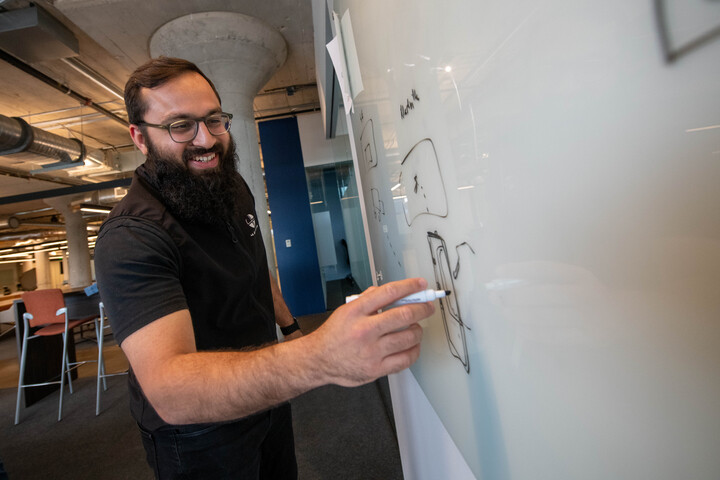
“Working with Miguel and Hannah has been great every week,” he said. “Going through the business, going through bottlenecks that we can strategically solve and getting outside perspectives has been great.”
In the final weeks of the program, Khan had a historic moment: installation of his unit at Cox Automotive’s Manheim Nashville as part of a water reclamation pilot. The car wash area of the facility currently processes 300 to 400 cars per day, totaling approximately 2.5 million gallons of water per year. This technology aims to clean and reuse this water and reduce costs for the site.
“I have a high respect for Cox and the way they’ve built out the company; the culture is just amazing,” Khan said. “So having a stronger relationship with Cox has been wonderful.”
With applications opening soon for the 2026 cohort and the next group of founders set to join at the end of the month, the program is building momentum — and drawing attention for the unique level of regional support it offers.
As Granier put it: “One thing that just really makes this unique is the amount of support we have from corporates and different partners in the ecosystem, from the chamber of commerce to the mayor’s office. They’ve really rolled out the red carpet because the city and the region really want these startups to succeed. I don’t know any place else where startups are going to have that opportunity.”
Learn more about the Cox Cleantech Accelerator here and follow the program’s LinkedIn profile for future updates.
